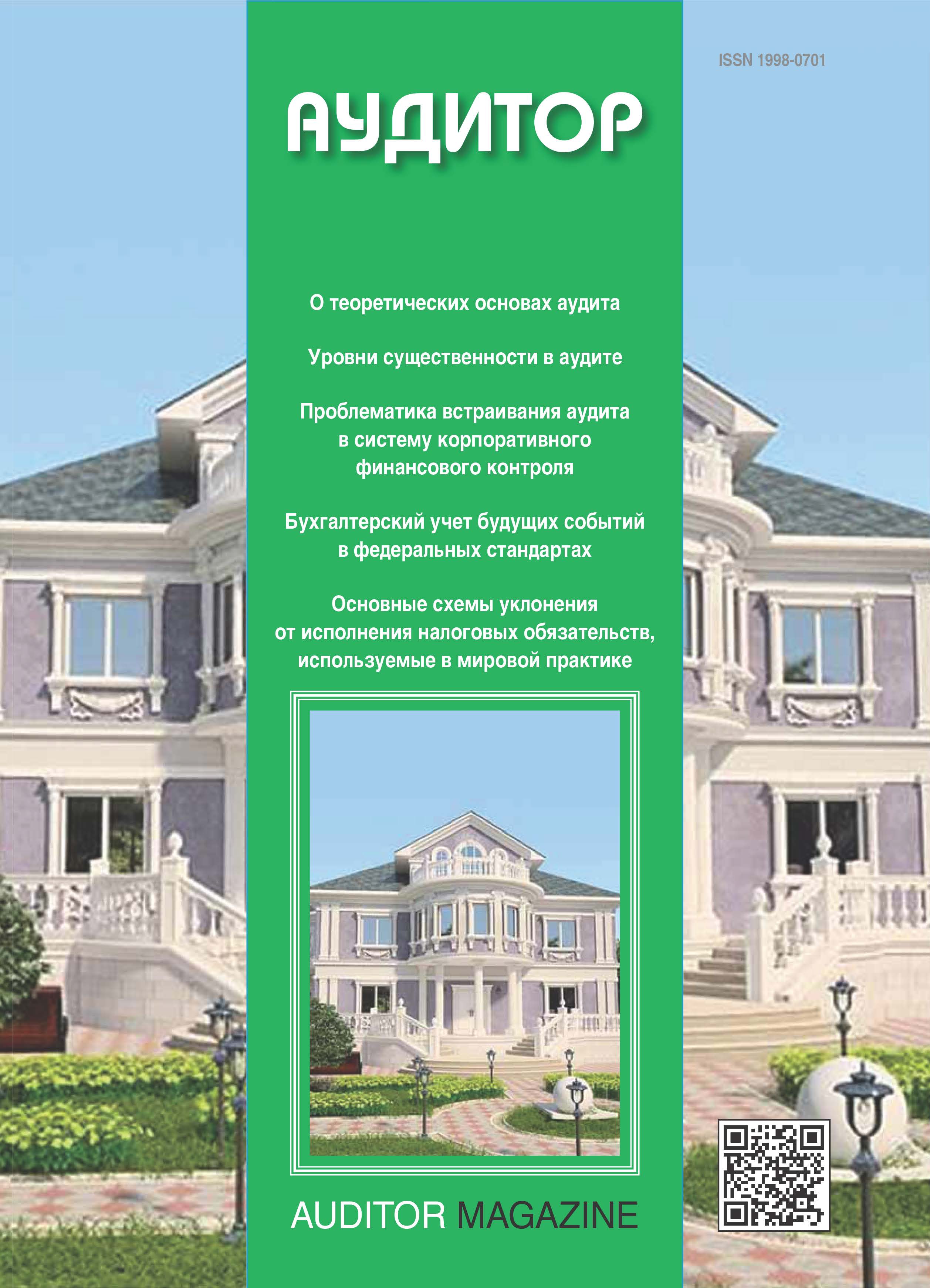UDC 657.6
The paper evaluates the scale of fraud and analyzes the role of auditing in its detection. Differences between corporate fraud and fraud in the context of auditing are identified. Fraud schemes related to illegal appropriation of assets and fraudulent financial reporting, including improper asset valuation, timing differences, overstatement or understatement of revenues and expenses, as well as inadequate disclosure of information, are systematized. Each scheme is illustrated with examples. Special attention is given to the peculiarities of applying fraudulent schemes in the Russian accounting practice. The research results are intended to simplify the process of assessing the fraud risks and developing responsive procedures during the audit of financial statements. The developed methodological approaches may be of interest to practicing auditors and other professionals in the field of financial control and analysis.
fraudulent activities, fraud, audit, misappropriation of assets, falsification of financial statements, manipulation of financial reporting
1. Federal Law of 06.12.2011 N 402-FZ "On Accounting" (as amended on 12.12.2023) // Reference legal system ConsultantPlus.
2. International Standard on Auditing 240 "The Auditor's Responsibilities Relating to Fraud in an Audit of Financial Statements" (implemented in the territory of the Russian Federation by Order of the Ministry of Finance of Russia dated 09.01.2019 N 2n) (as amended on 16.10.2023) // Reference legal system ConsultantPlus.
3. Accounting Regulations "Financial Statements of an Organization" PBU 4/99 (Order of the Ministry of Finance of the Russian Federation dated 06.07.1999 N 43n (as amended on 08.11.2010, with amendments dated 29.01.2018)) // Reference legal system ConsultantPlus.
4. Accounting Regulations "Income of an Organization" PBU 9/99 (Order of the Ministry of Finance of Russia dated 06.05.1999 N 32n (as amended on 27.11.2020)) // Reference legal system ConsultantPlus.
5. Accounting Regulations "Expenses of an Organization" PBU 10/99 (Order of the Ministry of Finance of Russia dated 06.05.1999 N 33n (as amended on 06.04.2015)) // Reference legal system ConsultantPlus.
6. Accounting Regulations "Accounting Policies of an Organization" PBU 1/2008 (Order of the Ministry of Finance of Russia dated 06.10.2008 N 106n (as amended on 07.02.2020)) // Reference legal system ConsultantPlus.
7. Federal Accounting Standard "Fixed Assets" FAS 6/2020 (Order of the Ministry of Finance of Russia dated 17.09.2020 N 204n (as amended on 30.05.2022)) // Reference legal system ConsultantPlus.
8. Amzelt, A.G. Analytical procedures for detecting risks of material misstatement due to fraud // Auditor. 2013. № 12(226). P. 22-26. EDN: https://elibrary.ru/RREZRJ
9. Bychkova S.M., Filatova O.N. The Essence of Fraudulent Actions and the Role of Audit in Their Detection // Auditor. 2003. № 1. P. 18-28. EDN: https://elibrary.ru/OPXNZJ
10. Itygilova E.Yu. Classification of distortions in financial statements in the context of the quality of accounting and auditing // International Accounting. 2015. № 23 (365). P. 35-46. EDN: https://elibrary.ru/TZXLSD
11. Kevorkova Zh.A. Distortion of accounting (financial) statements as a sign of economic crime // Audit Records. 2014. № 9. P. 32-38. EDN: https://elibrary.ru/SMSVHX
12. Kogdenko V.G. Corporate Fraud: Analysis of Asset Misappropriation Schemes and Financial Reporting Manipulation Methods // Economic Analysis: Theory and Practice. 2015. № 4 (403). P. 2-13. EDN: https://elibrary.ru/TGTLEZ
13. Leonov P.Yu., Sushkov V.M. Benford's Law as a Tool for Detecting Signs of Fraud in Accounting: Monograph. M: Plekhanov Russian University of Economics. 2023. 180 p. ISBN 978-5-7307-2063-3. EDN: https://elibrary.ru/FFWIXE
14. Nosova S.S., Norkina A.N., Morozov N.V. Typologies of Financial Frauds: Textbook. M.: Knorus. 2021. 474 p. ISBN 978-5-406-06602-7. EDN: https://elibrary.ru/FEAOOE
15. Sotnikova L.V. Fraud in Financial Reporting: Detection and Prevention: Textbook. M.: Rusains, 2019. 394 p. ISBN 978-5-4365-3300-1. EDN: https://elibrary.ru/SHQSFL
16. Suits V.P., Voloshin D.A. Distortion of Corporate Reporting: Detection, Prevention, and Prevention // New Perspectives on the Development of Economic Sciences: Innovations and Risks. 2014. P. 159-161. EDN: https://elibrary.ru/VPOHCF
17. Sushkov V.M. Methods of Data Analysis in Audit Procedures for Assessing Risks of Material Misstatement Due to Fraudulent Actions // Financial Security. Current State and Development Prospects: Materials of the VIII International Scientific and Practical Conference of the International Network Institute in the Field of AML/CFT, Moscow, December 14-15, 2022. Volume 1. M.: National Research Nuclear University "MEPhI". 2022. P. 438-451. EDN: https://elibrary.ru/OKZQRK
18. Sushkov V.M. Fraudulent Actions as a Type of Deviant Economic Behavior // Innovative Mechanisms of Managing Digital and Regional Economy: Materials of the V International Student Scientific Conference, Moscow, June 15-16, 2023. Volume 2. M.: National Research Nuclear University "MEPhI". 2023. P. 84-92. EDN: https://elibrary.ru/XGXSEW
19. Sushkov V.M., Leonov P.Y. Methodological approach to assessing the risk of fraudulent actions by the audited person based on the analysis of high-risk accounting records // Materials of the III International Scientific and Practical Forum on Economic Security "VIII VSKEB": Collection of materials of the International Scientific and Practical Forum, Moscow, April 26-28, 2022. M.: National Research Nuclear University "MEPhI". 2022. P. 111-126. EDN: https://elibrary.ru/ODFILG
20. Shtefan M.A., Bykova D.A. Fraud audit: concept and essence // International Accounting. 2012. No. 40(238). P. 19-27. EDN: https://elibrary.ru/PEFBMH
21. Shtefan M.A., Feruleva N.V. Audit of financial statements falsification: specific aspects // International Accounting. 2017. Vol. 20. No. 2 (416). P. 88-105. DOI: https://doi.org/10.24891/ia.20.2.88; EDN: https://elibrary.ru/XKOKZH
22. ACFE Report to the Nations 2024 [Online resource] // Association of Certified Fraud Examiners. URL: https://legacy.acfe.com/report-to-the-nations/2024 (accessed on: 07.01.2024).
23. PwC’s Global Economic Crime Survey 2022 [Online resource] // PricewaterhouseCoopers. URL: https://www.pwc.com/gx/en/services/forensics/economic-crime-survey/2022.html (accessed on: 07.01.2024).






